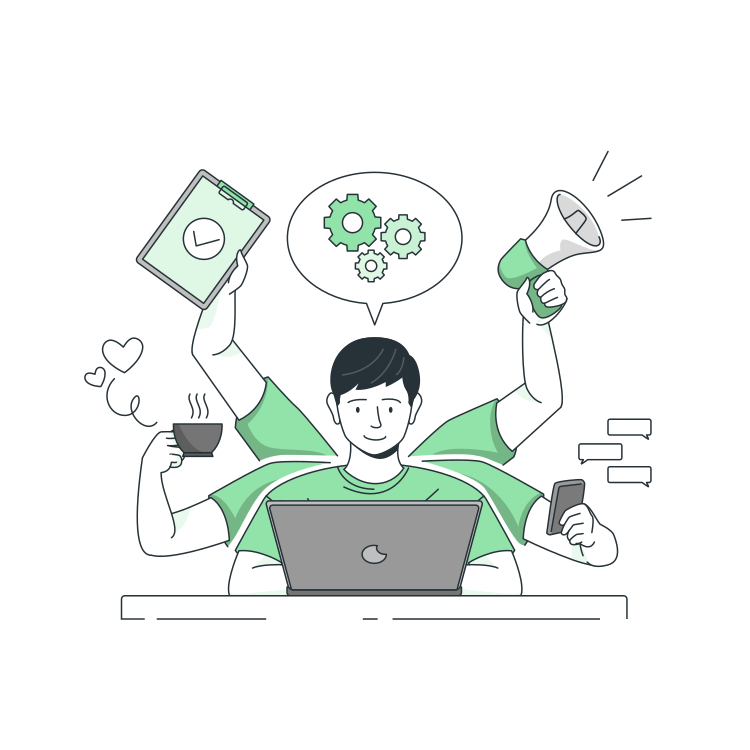How to Focus in a Distracted World
We need to assume control of our lives because it seems that everything is designed to distract us.
We work hard, but not always effectively. We're overwhelmed with information and distractions. Studies reveal that we only manage to focus on a computer task for 40 seconds before becoming distracted or interrupted—something that can be especially challenging for those with ADHD.
According to reports, 41% of workers are feeling burned out, while we spend almost 4 times more time in meetings than before the pandemic. Yet, productivity data shows little growth over the past decades.
We live in a hustle culture that keeps us connected 24/7, leading us to believe we're multitasking and productive. However, research shows the opposite—attempting to multitask actually reduces our IQ by 10 points. For people with ADHD, this constant bombardment of tasks and notifications can exacerbate difficulties with maintaining attention and focus.
Like everything in life, it requires intention. To overcome these challenges, we need to desire change, understand ourselves, and be willing to put in the effort to change habits and attitudes.
For those of us with ADHD, this means recognizing the specific ways in which distractions impact our ability to concentrate and actively working to address them.
We must discard the belief that we cannot stop and that we must always be producing. This mindset has led us to exhaustion rather than high performance, productivity, or happiness.
1. Say no to multitasking
We should choose what to focus on. We must accept that it's impossible to do everything at once and that hyper-focusing on each task will be more productive. If you have ADHD, you may have noticed that your productivity improves when you focus intensely on one task at a time, rather than juggling multiple tasks.
This requires letting go of multitasking and distractions as much as possible.
Are you in a meeting? Turn off notifications. Are you with family? Give them your full attention and put your phone away. Are you working on an analysis or presentation? Let others know you cannot be interrupted.
The smartphone can be a major offender in terms of productivity, happiness, and mental health. Managing smartphone use is crucial to reducing distractions and improving focus. For individuals with ADHD, this is almost a survival strategy.
Effective communication is crucial for these changes, as today's culture doesn't accept waiting even a minute for responses. If we receive an email and don't respond immediately, we might get the same message through different channels.
This excessive communication brings more distractions and pulls us out of a state of flow, leading to even more unproductiveness. To return to a state of engagement (flow), it takes 25 minutes after being interrupted or distracted. Creating an environment that minimizes interruptions and distractions is essential for maintaining focus and productivity.
2. Eliminate or reduce distractions
Some distractions are beyond our control, like external noises. Nevertheless, we can think about how to minimize their impact—perhaps by using noise-canceling headphones.
Most distractions, however, are the result of our own choices. We become addicted to the dopamine rush from social media, likes, and engagement, spending more hours in front of screens with little focus or presence. ADHD makes it even harder to manage these distractions, as they can significantly impact our ability to concentrate and stay on task.
We need to identify what distracts us and manage these distractions intentionally. We might think we can't go a minute without our phones, but in reality, they can be the biggest offenders of productivity, happiness, and mental health. We need to use technology to our advantage rather than the other way around.
Imagine if you could spend a week without your phone. You might realize that most notifications and messages are useless but take up a significant part of your day.
We don’t need to go on a silent retreat or disconnect from our phones entirely. We can have focused moments in our day without notifications or endlessly scrolling through stories without thinking.
Hyperfocus into a habit
Finding mindfulness in our daily lives brings happiness and productivity. It may seem that silly and commonplace statement you’ve heard so many times, but it’s not: for those of us with ADHD, learning to harness hyperfocus as a productive tool rather than a hindrance can be transformative. For this, it’s important to find our strengths, what gives us meaning, and what creates a state of flow.
The more we understand who we are, what we love to do, and what we do well, the easier it is to focus. Above all, it requires intentionality and discipline. No one will do it for us.
Again, no one will do it for us.
It’s not easy to stay attentive and focused in this distracted world. We are constantly stimulated, and we ourselves overstimulate our brains without even realizing it. It undeniably requires a good amount of self-knowledge, self-responsibility, and discipline.
A shift to a more conscious and attentive life is possible, but, as with everything truly important in life, it demands effort. However, there are no reports of regrets from those who accept the challenge and elevate themselves to another level!











I'm so lucky with my job as we all have email signatures that say we'll reply to emails within 3 working days, which sets good boundaries, and we're encouraged to close Outlook when we need to focus on work.
It's such a breath of fresh air after all the previous jobs I've had where we're expected to be constantly available.